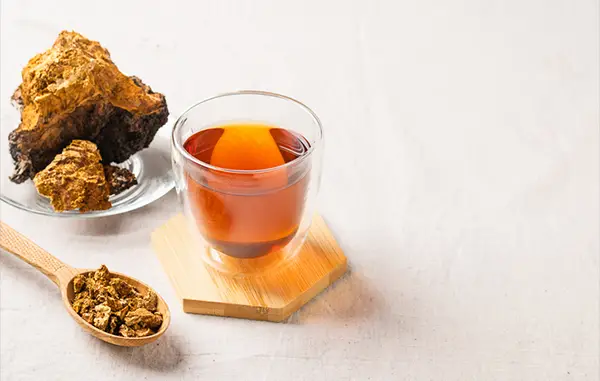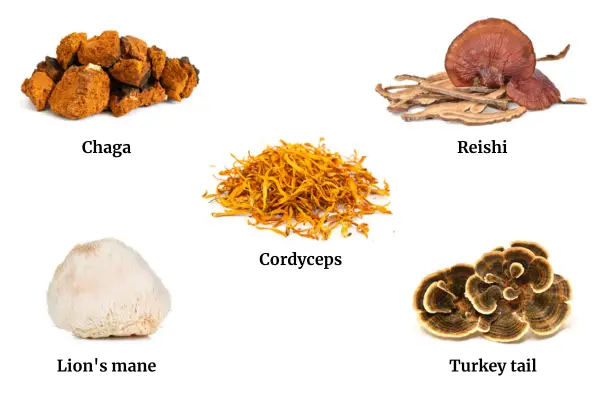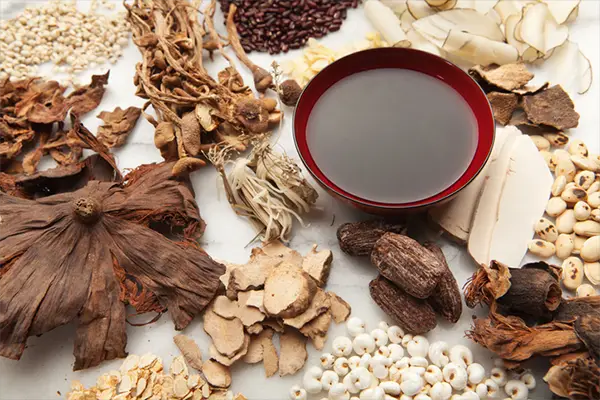
A cup of hot tea has many healthy benefits, so it’s no surprise that tea trends like yerba mate, golden milk, and detox tea keep popping up. The “newest” arrival to the scene is mushroom tea — but what exactly is it?
True teas — including black tea, green tea, oolong tea, and matcha — come from the Camellia sinensis plant. The term “herbal tea” refers to infusions made with fruit or other herbs that do not contain Camellia sinesis, including mushrooms.
Mushroom tea is made by steeping mushrooms in hot water to create a savory brew that tastes much different from a cup of coffee or grassy green tea. Mushrooms may be whole or ground, fresh or dried. Common varieties used in mushroom tea include functional fungi like reishi, lion’s mane, or the superfood chaga.
Mushroom tea devotees say this trendy drink can increase energy, support cognitive function, and may even have adaptogenic benefits.
So does mushroom tea live up to the hype? We turned to the science and registered dietitians to find out.
What Is Mushroom Tea?
Although it’s having a moment right now, mushroom tea is far from new. Many of the mushrooms commonly used today are part of traditional Chinese medicine, in which mushrooms were known as an “elixir of life.”
Other countries, including Japan, Korea, and Russia, have also used mushroom tea for centuries, says Noelle Citarella, MS, RDN, CDN, a registered and certified dietitian nutritionist with Buffalo Nutrition and Dietetics.
Any edible mushrooms can be used to make tea, but the most common mushrooms found in packaged teas are:
- Chaga
- Reishi
- Lion’s mane
- Cordyceps
- Turkey tail
Mushroom Tea Benefits
The polysaccharides in mushrooms may support a healthy immune system by helping to activate cells important to the immune system, explains Robin Foroutan, MS, RDN, HHC, integrative medicine dietitian, spokesperson for the Academy of Nutrition and Dietetics, and owner of Nutrition by Robin.
However, most of the research in this area is focused on analyzing the components of the mushroom and determining which nutritive values are beneficial for human consumption. More research is needed to confirm if and how mushrooms affect immune function.
Another beneficial mushroom compound is ergothioneine, an amino acid with antioxidant properties, Foroutan says.
Many of the mushrooms used in mushroom tea are also considered adaptogens. “Adaptogens are any type of bioactive compound that can protect against oxidative stress and reduce the stress response, so you may feel less exhausted from dealing with stress,” Citarella says.
Which Type of Mushroom Tea is Best?
Certain types of fungi used in mushroom tea may offer specific benefits. “The scientific evidence isn’t that strong yet, but it’s promising,” Citarella says.
To back up these claims, we’ll need more randomized trials using humans rather than animals or cells, but these are some of the potential benefits:
- Chaga mushrooms have been used for centuries in traditional Chinese medicine and Russian herbalism to potentially help the body adapt to the effects of oxidative stress.
- Reishi mushrooms may support healthy immune function.
- Lion’s mane was the subject of a rodent study for its potential benefits for brain health.
- Cordyceps may help improve exercise performance, though research is still limited, as both studies cited contained a small number of participants.
- Turkey tail is believed to help support the immune system — but, again, further research is needed.
Mushroom Tea Precautions
Be mindful that certain types of mushrooms may have side effects.
“If you have any health conditions, check with your doctor or dietitian to make sure they are right for you,” Foroutan says. As with other supplements, women who are pregnant or breastfeeding should talk to their doctor about these teas.
Above all, you cannot ignore the rest of your diet. “One tea will not change everything for you,” Citarella says. “You have to look at the whole picture.”
If you’re looking to improve your athletic performance or feel less foggy, it’s important to take stock of your overall health and not just your tea of choice.
Where to Find Mushroom Tea
If you’re interested in mushroom tea, it’s not difficult to DIY. You can steep whole or ground fresh mushrooms in hot water — or buy dried mushrooms and grind them into a powder — then simply strain and sip.
However, Foroutan notes, it’s typically easier and more practical to buy pre-made mushroom tea powders and blends, which you can find online and at many supermarkets. Or if you’re looking for a mix of adaptogenic benefits, fiber, and protein, skip the tea and try Plant-Based Vegan Shakeology, which includes adaptogens like chaga and reishi.*
*These statements have not been evaluated by the Food and Drug Administration. This product is not intended to diagnose, treat, cure, or prevent any disease.
The post Should You Be Drinking Mushroom Tea? appeared first on BODi.


